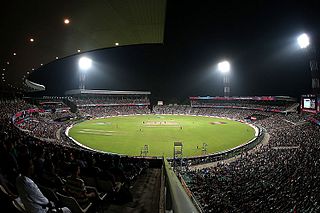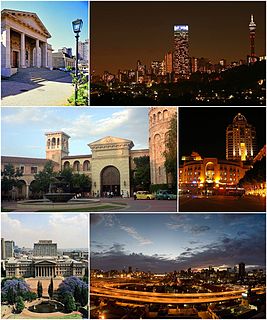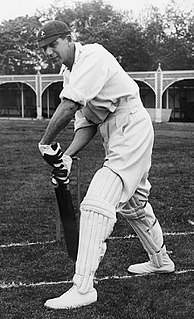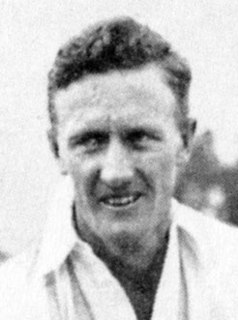 | ||||||||||||||||||||||||||||||||||||||||
| Cricket information | ||||||||||||||||||||||||||||||||||||||||
|---|---|---|---|---|---|---|---|---|---|---|---|---|---|---|---|---|---|---|---|---|---|---|---|---|---|---|---|---|---|---|---|---|---|---|---|---|---|---|---|---|
| Batting | Right-handed | |||||||||||||||||||||||||||||||||||||||
| Bowling | Right-arm | |||||||||||||||||||||||||||||||||||||||
| International information | ||||||||||||||||||||||||||||||||||||||||
| National side | ||||||||||||||||||||||||||||||||||||||||
| Career statistics | ||||||||||||||||||||||||||||||||||||||||
| ||||||||||||||||||||||||||||||||||||||||
Source: Cricinfo | ||||||||||||||||||||||||||||||||||||||||
Rolland Beaumont (4 February 1884 – 25 May 1958) was a South African cricketer. He was born at Newcastle, Natal, and died in Berea, Durban, aged 74. He attended Hilton College.

South Africa, officially the Republic of South Africa (RSA), is the southernmost country in Africa. It is bounded to the south by 2,798 kilometres (1,739 mi) of coastline of Southern Africa stretching along the South Atlantic and Indian Oceans; to the north by the neighbouring countries of Namibia, Botswana, and Zimbabwe; and to the east and northeast by Mozambique and Eswatini (Swaziland); and it surrounds the enclaved country of Lesotho. South Africa is the largest country in Southern Africa and the 25th-largest country in the world by land area and, with over 57 million people, is the world's 24th-most populous nation. It is the southernmost country on the mainland of the Old World or the Eastern Hemisphere. About 80 percent of South Africans are of Sub-Saharan African ancestry, divided among a variety of ethnic groups speaking different African languages, nine of which have official status. The remaining population consists of Africa's largest communities of European (White), Asian (Indian), and multiracial (Coloured) ancestry.

Cricket is a bat-and-ball game played between two teams of eleven players on a field at the centre of which is a 20-metre (22-yard) pitch with a wicket at each end, each comprising two bails balanced on three stumps. The batting side scores runs by striking the ball bowled at the wicket with the bat, while the bowling and fielding side tries to prevent this and dismiss each player. Means of dismissal include being bowled, when the ball hits the stumps and dislodges the bails, and by the fielding side catching the ball after it is hit by the bat, but before it hits the ground. When ten players have been dismissed, the innings ends and the teams swap roles. The game is adjudicated by two umpires, aided by a third umpire and match referee in international matches. They communicate with two off-field scorers who record the match's statistical information.

The Berea is a ridge above the city of Durban, KwaZulu-Natal, South Africa on the northern side which overlooks the city centre and the Indian Ocean. Berea is also used as a collective designation for the suburbs in the area. It has been described as the area between the Howard College Campus of the University of KwaZulu-Natal, and the Burman Bush Nature Reserve.
Contents
Beaumont was a hard hitting middle-order batsman and a good fielder. His first-class career spanned the years 1908 to 1914 and consisted of 32 matches, most of which were for South Africa during their tour of England in the wet summer of 1912. His first match of importance was for Wanderers when the Johannesburg club drew with a Rest of South Africa team containing S.J. Snooke and A.W. Nourse. He also turned out six times for Transvaal and represented South Africa at Test level in five matches against England and Australia. When playing his natural game Beaumont was a free-flowing batsman but too often he let an over-cautious nature restrict his talent. He scored his only first-class century, 121, whilst captaining Transvaal in a two-day match at Johannesburg against P.W. Sherwell’s XI in November 1913. [1] But in all first-class matches he built only six scores of 50 or more. His highest Test score was 31, compiled against the Australians at Old Trafford during the Triangular Series of 1912. No obituary for Beaumont appeared in Wisden .
First-class cricket is an official classification of the highest-standard international or domestic matches in the sport of cricket. A first-class match is of three or more days' scheduled duration between two sides of eleven players each and is officially adjudged to be worthy of the status by virtue of the standard of the competing teams. Matches must allow for the teams to play two innings each although, in practice, a team might play only one innings or none at all.
The South Africa national cricket team toured England from May to September 1912 and took part in the 1912 Triangular Tournament, playing three Test matches each against the England national cricket team and the Australia national cricket team. The tournament was won by England. South Africa were captained by Frank Mitchell and Louis Tancred.

Johannesburg is the largest city in South Africa and one of the 50 largest urban areas in the world. It is the provincial capital and largest city of Gauteng, which is the wealthiest province in South Africa. While Johannesburg is not one of South Africa's three capital cities, it is the seat of the Constitutional Court. The city is located in the mineral-rich Witwatersrand range of hills and is the centre of large-scale gold and diamond trade.
He managed an oil company in Trinidad in the 1920s and donated the Beaumont Cup, which was contested by North Trinidad and South Trinidad beginning in the 1925-26 cricket season. [2]

Trinidad and Tobago, officially the Republic of Trinidad and Tobago, is a twin island country that is the southernmost nation of the West Indies in the Caribbean. It is situated 130 kilometres south of Grenada off the northern edge of the South American mainland, 11 kilometres off the coast of northeastern Venezuela. It shares maritime boundaries with Barbados to the northeast, Grenada to the northwest, Guyana to the southeast, and Venezuela to the south and west.
The Beaumont Cup was a Trinidadian first-class cricket competition which regional sides competed for, the matches taking place over three days.
The North Trinidad cricket team played first-class cricket from 1959 to 1979, competing in the Beaumont Cup and its successor competition the Texaco Cup.











